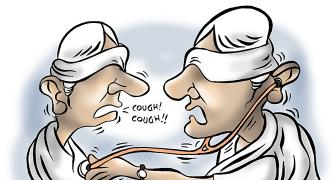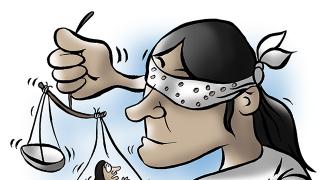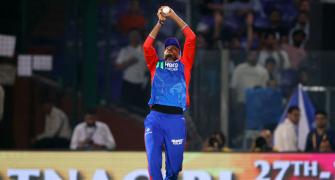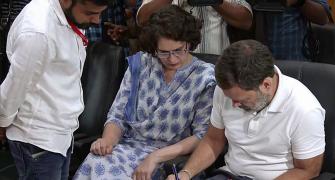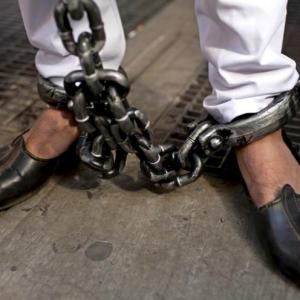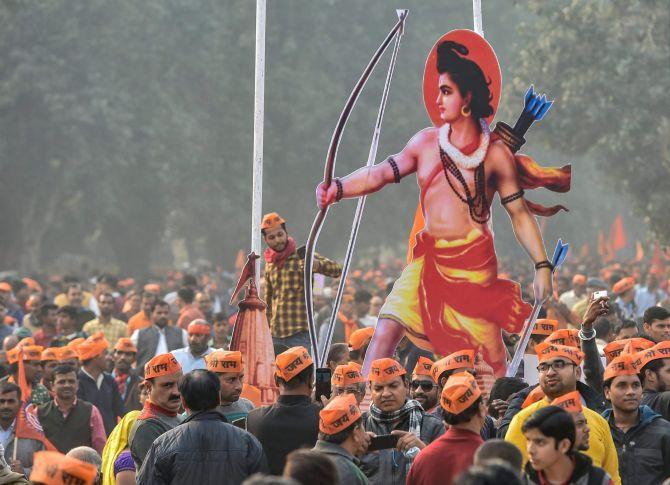Security has been put on high alert across the nation as the Supreme Court is all set to deliver its verdict in the Ram Janambhoomi-Babri Masjid dispute, Sabarimala case and a host of other legal wrangles.
R Rajagopalan reports.
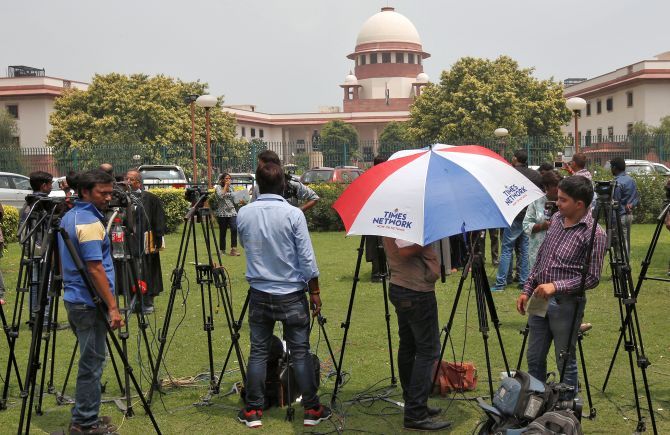
In a span of the next 10 working days starting November 4, the Supreme Court of India, which reopens on Monday after the Diwali holidays, will see its benches led by Chief Justice Ranjan Gogoi deliver 10 major verdicts.
Of these, the review petitions against the Supreme Court's verdicts on Kerala's Sabarimala temple and the Rafale fighter jet deal, bringing the court and the Chief Justice of India's office under the Right To Information Act, scrapping of Article 370 in Jammu and Kashmir, and the biggest of all cases -- the Ayodhya dispute -- are the most significant; they will also be Chief Justice Gogoi's last cases before he retires on November 17.
The judgments in the Sabarimala and RTI cases are expected to be pronounced this week between Tuesday and Friday, and the verdict in the Ayodhya matter would be pronounced on November 13.
The CJI Gogoi-led 5-member Constitution bench had reserved its verdict in the Ayodhya matter on October 16 after concluding a 40-day-long hearing in the case -- without breaking for the Diwali holidays -- thereby bringing down the curtains on the judicial battle over the 2.77 acre land dispute that has gone on for 70 years.
Fourteen appeals have been filed in the Supreme Court against the Allahabad high court's 2010 judgment, delivered in four civil suits, which had partitioned the 2.77 acre disputed land equally among the three parties -- the Sunni Waqf Board, the Nirmohi Akhara and Ram Lalla.
CJI Gogoi had himself remarked during one of the hearings that if the verdict is delivered in four weeks, the court 'will achieve a miracle'.
Supreme Court Justice Sharad Arvind Bobde, who will take over as the next Chief Justice of India in an interview to NDTV last week said 'the Ayodhya title dispute case was one of the most important cases in the world today.'
Justice Bobde is part of the Constitution bench that heard the appeals against the Allahabad high court's 2010 verdict.
Other than the Ayodhya case, the apex court is also expected to deliver its verdict on a batch of over 45 review petitions, filed against its landmark 2018 majority verdict allowing the entry of women of all ages in the Sabarimala temple.
Another bench led by CJI Gogoi had, in May, reserved its judgment on the review petitions filed against the court's December 2018 judgment refusing criminal investigation into the Rafale fighter jet deal.
The apex court's calendar for the first fortnight of November is already blocked, with the registrar general's diary showing a red mark against all working days, indicating that there will be no breaks.
Keeping in mind the emotions the Ayodhya issue in particular evokes among the public, the Centre is pulling out all stops to maintain law and order across the nation.
Security forces have been asked to remain vigilant and prevent tensions between communities. The Intelligence Bureau has also issued top secret circulars to the directors generals of police of all states asking that all places of worship be guarded across the 755 districts in the country.
Additionally, the superintendents of police will have a video conference with the Union home ministry in the next two or three days to put in place a security strategy to prevent any untoward incidents.
A control room will also be set up in the IB headquarters to monitor the internal law and order situation across the country.
Ahead of the crucial judgment Prime Minister Narendra Damodardas Modi has asked citizens to remain calm. Rashtriya Swayamsevak Sangh Sarsanghchalak Mohan Bhagwat and Muslim clerics have also issued appeals to maintain peace.
The Ayodhya land dispute
The case is one of the most high profile cases in India and the judgment will ink a new chapter in the nation's socio-religious chapter.
Fourteen appeals have been filed in the Supreme Court against the Allahabad high court's 2010 judgment, delivered in four civil suits, which had partitioned the 2.77 acre disputed land equally among the three parties -- the Sunni Waqf Board, the Nirmohi Akhara and Ram Lalla.
Entry of women in the Sabarimala temple
Another five judge Constitution bench, headed by the CJI, will pronounce its verdict on the pleas seeking review of the top court's judgment allowing women of all ages to enter the Sabarimala temple in Kerala.
The apex court had on February 6 reserved its judgment on 65 petitions, including 57 seeking review of the court's September 28, 2018, verdict allowing entry of women of all ages.
The petitioners had argued that since Lord Ayyappa at Sabarimala was celibate, the court must not interfere with the tradition of barring entry of women in the menstrual age group of 10 to 50 years.
Rafale deal
Another high-voltage case pending decision before a three-judge bench headed by the CJI is the review petitions challenging the Supreme Court's 2018 decision giving the Narendra Modi government a clean chit on the procurement of 36 Rafale fighter jets from France under an inter-governmental deal.
The court had on May 10 reserved its verdict on the petitions, including those filed by former Union ministers Yashwant Sinha and Arun Shourie along with advocate Prashant Bhushan, seeking a CBI inquiry into the alleged corruption and irregularities in the multi-billion dollar deal.
RTI Act
Verdict is also expected on the appeals filed in 2010 by the secretary general of the Supreme Court and the central public information officer of the apex court against the Delhi high court order holding that the CJI's office comes under the ambit of the RTI Act.
The five-judge CJI-led Constitution bench had on April 4 reserved its verdict on the appeals filed by its own registry challenging the Delhi high court order which held that the apex court and the office of Chief Justice of India constitute public authority under the Right to Information Act, liable to part with information to RTI applicants.


